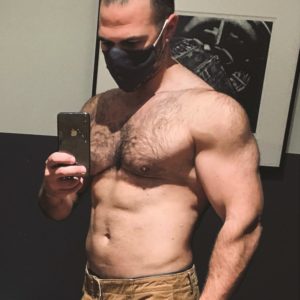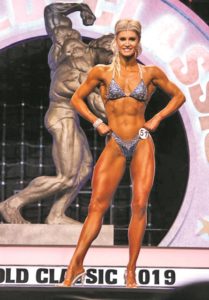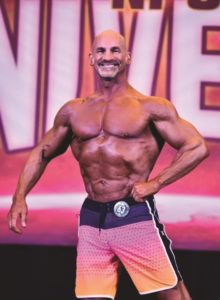PROVINCETOWN — Mike Flanagan has spent this pandemic year doing what he loves. Lifting weights five days a week, performing cardio exercises seven days a week, and eating a precisely planned diet, he’s been preparing his body for competition.
“Bodybuilding,” Flanagan said, “is one of the only sports I’ve ever loved.” He grew up in Brockton and started going to a gym there at 15. Now 36, he lives in Provincetown and hopes to participate in his first professional competition this July in Connecticut.
Flanagan trains at Mussel Beach Health Club in town and had planned his first competition for last summer, until the pandemic closed that door. Flanagan was forced to train remotely when the gym closed, but his personal trainer, Nate Telow, has stuck with him.

Preparation for a bodybuilding competition requires diligence and commitment, Flanagan explained. Each day he’ll focus on a different body part: back, chest, shoulders, arms and legs.
Flanagan is on a strict diet with a specific food list. He weighs and separates each meal into Tupperware containers so he can follow his necessary nutrition intake.
The rookie bodybuilder weighed 260 pounds at the start of his training but needed to burn some fat, so he quickly dropped 50 pounds and now weighs 215. Still, that’s not enough. Flanagan said his ideal competition weight is 198 pounds.
“I’m taking off body fat little by little,” he said. “I’ve never brought my body that low before. I’m psyched to see how that looks.”
Seeing results along the way has encouraged Flanagan to continue with his diet no matter how annoying it can be. As his muscles become more defined, he’s been practicing mandatory poses that he must showcase on stage.
“I want to put the time in to get comfortable with those,” he said. “Posing is tough. You’re tired from not eating a lot leading up the competition. It’s deceptively hard.”
The word “bodybuilding” may conjure up images of overly tanned, extremely muscular people posing for the camera. While it may look as if all bodybuilders are on steroids, that’s not the case, Flanagan said.
“I’m all natural,” Flanagan said. “I’m not even taking fat burners. I’m too afraid to touch that stuff.”
Some bodybuilding competitions test for performance-enhancing drug use while others do not. The competition Flanagan is entering will not be testing, so competitors are free to use steroids if they please. Flanagan knows he’ll be at a disadvantage there.

Tatsiana Hurst, a trainer at Mussel Beach who lives in Truro, says women bodybuilders face the same conundrum. Hurst is 39 and has been training with weights since she was 25. She didn’t start competing until 2015 and has placed in the top three in the four competitions she’s entered.
Because the rules and testing, including polygraph tests, vary from one contest to another, you know sometimes you might be at an unfair disadvantage.
Even so, she said, “I never had any interest in using or trying” performance-enhancing drugs. “I prefer to push myself as hard as I can to fulfill my natural potential.”
Rick Silverman is a veteran bodybuilder who also spent his career avoiding steroid use.
Silverman lives in Charlestown but spends summers in Provincetown and regularly works out at Mussel Beach. He’s a plastic surgeon by trade and focuses on treating patients who have abused steroids.
He believes there’s a measurable, safe way to take steroids when bodybuilding, but said that often young bodybuilders rely too quickly on enhancements.
“Using supplements and growing muscles is putting force on your tendons,” he said. If supplements are abused, then “you’re going to have a lot of problems growing up,” he said. “I think too many guys walk in the gym and say, ‘Where’s the drugs?’ ”
Silverman began competing in 1996. In 1998 he placed first overall at the Pioneer Valley Open in Western Mass. and went on to compete for the next decade in local and national competitions. He stopped competing for nearly 20 years until 2019, when he got the itch to start again.

“I was at Jay Cutler’s contest in Boston in 2018 and was joking that I’d jump in for my 60th birthday,” Silverman said. Cutler is a renowned American professional bodybuilder.
In 2019, he decided to enter Cutler’s show and came in first in men’s physique in the Over 50 class just before his birthday.
Silverman agreed with Flanagan that one of the hardest parts in training for a competition is preparing specific foods for a diet.
“The toughest thing is working around a busy work schedule,” Silverman said. When he was balancing his work with competing, he said, it was crucial to have his meals organized.
Now, he said, his trainer allows him to eat the foods he wants, but he has set amounts of macronutrients (protein, carbohydrates, and fats) that he must stay below each day in order to maintain his physique.
Silverman thinks he may compete in the Over 60 class next year. The oldest level of competition is typically Over 70.
What makes bodybuilders keep at it? Part of what Hurst said she loves about the sport is the structure. That, and a sense of accomplishment, which, she said, is rewarding regardless of how she places. “The body I present on stage is something I built and that makes me the proudest,” she said.
Those who train this way have formed a supportive community in Provincetown. As Flanagan enters the final months of his training, he’s received support from many at Mussel Beach.
“Everyone has been super supportive,” Flanagan said. “It’s like I have a little village behind me.”
